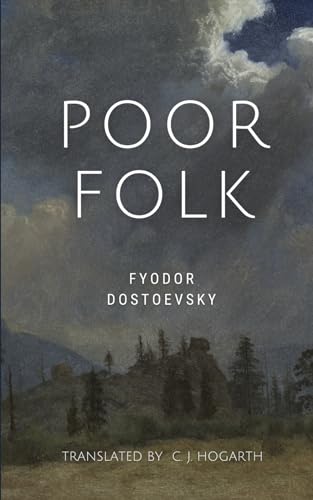Poor Folk
Fyodor Dostoevsky
BOOK REVIEW

Poor Folk by Fyodor Dostoevsky is not just a novel; it's a heart-wrenching tapestry that weaves the struggles of the impoverished into the grand narrative of human experience. Written in 1846, Dostoevsky's first major work serves as a raw portrayal of the lives of the downtrodden in St. Petersburg, a poignant commentary on social class, and perhaps, a timeless reflection on human dignity.
In a world that often feels divided between the haves and have-nots, Poor Folk throws you headfirst into the life of Makar Diaryanov, a humble clerk whose existence revolves around the small joys and relentless sorrows of poverty. From his letters to the beautiful, yet equally poor, Varvara Dobrosyolova, we are invited into the intimate corners of their lives. Dostoevsky's epistolary style allows readers to eavesdrop on their dreams, disappointments, and the stark reality of their desperate conditions. You can almost feel the weight of each word as you digest their correspondence, a mix of hope and despair.
This is not merely a story; it's a battle cry against the indifference of society. Dostoevsky paints his characters with such vivid colors that you can almost hear their hearts beat in despair. The stifling social conditions, the grinding poverty, and the oppressive weight of class barriers echo throughout the pages, forcing you to confront the injustices that have plagued humanity for centuries. The weight of this reality presses down on you, demanding your empathy and igniting a flame of activism in your spirit. 🔥
Critics have noted how the novel captures a pivotal moment in Russian literature, where themes of alienation and existential crises began to emerge. Dostoevsky, who himself faced financial ruin and went through profound personal struggles, channels his own experiences into a work that raises uncomfortable questions about fate, responsibility, and compassion. Readers now often echo the sentiments of early critics who emphasized the novel's revolutionary nature, foreshadowing his later masterpieces like Crime and Punishment and The Brothers Karamazov, which would further dissect the human condition.
Yet, Poor Folk has not escaped scrutiny. Some readers have argued that the narrative can feel stagnant, entrenched in the mundanity of poverty without enough action to sustain interest. Frustration simmers in the reviews, with a handful lamenting its lack of a conventional plot. But isn't that precisely the point? Life for the impoverished is rarely a series of dramatic events; it is a relentless struggle for survival, a slow burn of existence filled with small victories and crushing defeats. In this sense, the novel is a mirror reflecting the monotonous nature of real life, where hope and despair often coexist in the same breath.
Dostoevsky's profound mastery lies not only in his storytelling but in his ability to stir a deep sense of compassion within you. You must feel the struggles of Makar and Varvara as if they were your own-because, in many ways, they are. This is the essence of Dostoevsky; he compels you to consider not just their plight, but your role in the fabric of society. 😢
As you read, you may find yourself wrestling with questions: What is the responsibility of those who have toward those who have not? How do our societal structures shape our humanity? Your thoughts spiral inward, echoing the sentiments of Dostoevsky's characters-searching for meaning amid the chaos of existence.
The impact of Poor Folk reverberates beyond its pages; it has influenced writers like George Orwell and Ernest Hemingway, who grappled with themes of social injustice and human suffering in their own works. Their literary legacies owe much to the emotional palette Dostoevsky lays out in this early triumph. His prose is a clarion call, illuminating the shadows cast by society, pushing us to confront our moral obligations.
So, as you navigate through the daggers of despair and the rays of hope in Poor Folk, know that Dostoevsky is not just urging you to read-he's challenging you to engage. You're not simply a passive observer; you are a participant in the dialogue he crafts around human suffering and resilience. 🌍
In the end, Poor Folk stands as a powerful reminder of the human spirit's capacity to endure against all odds. With each letter, Dostoevsky invites you to forge connections, to feel deeply, and to act with compassion. If you allow it, you'll emerge from this reading experience irrevocably changed, as if you've stepped into the shoes of those who tread the hard road of poverty. So dive in, and embrace the tumultuous emotions that await you in this classic that has transcended time and still speaks to the heart of humanity.
📖 Poor Folk
✍ by Fyodor Dostoevsky
🧾 122 pages
2019
#poor #folk #fyodor #dostoevsky #FyodorDostoevsky